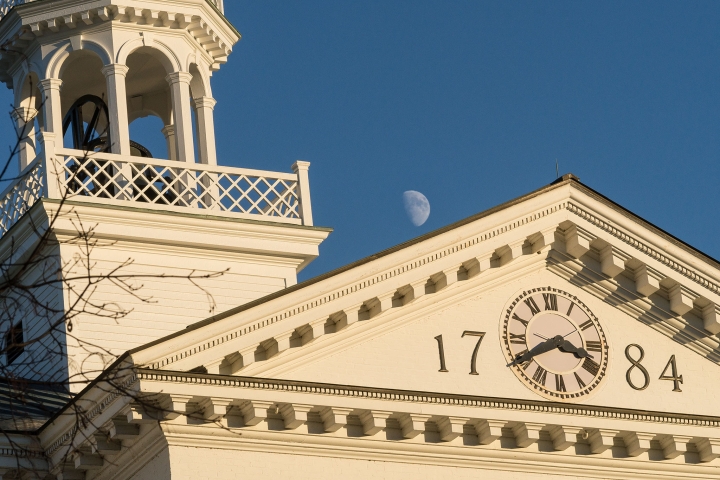The Dartmouth community has established a new high mark for philanthropic giving in a single year, strongly supporting the ambitious global goals of Dartmouth’s comprehensive campaign, The Call to Lead.
Gifts and pledges to Dartmouth in the 2018 fiscal year, which ended on June 30, totaled $422.6 million, exceeding the 2017 total ($285.6 million) by 48 percent and the previous record-setting total ($318.8 million in 2016) by nearly 33 percent.
Gifts received are already benefiting Dartmouth students and faculty across the campus with new scholarship funds, increased support for faculty, expanded opportunities for undergraduate research, improvements to multiple buildings, and new support for immersion in other cultures through experiences such as Dartmouth’s Language Study Abroad and Foreign Study Programs. A major gift also led Dartmouth to name the Guarini School of Graduate and Advanced Studies, which will prepare future academic leaders.
Strong philanthropic support in the last fiscal year has helped drive Dartmouth’s $3 billion campaign, which was publicly launched in April. In the four years since the campaign’s official beginning, more than 81,000 donors had given or committed a total of $1.74 billion through the end of June.
“I want to thank everyone who made a gift during this extraordinary year,” says President Philip J. Hanlon ’77. “The Call to Lead is a call to action. Humankind needs educational institutions like Dartmouth to step forward and make a meaningful difference in the lives of people around the world. This historic investment by the Dartmouth community is both accelerating and energizing our efforts.”
Gifts Advance the Dartmouth Experience
Gifts and commitments of all sizes contributed to Dartmouth’s success in 2018, including 25,173 gifts of $250 or less.
Support for the Dartmouth College Fund rose to $47 million, with 41 percent of alumni participating, up from 39.5 percent in the previous year. Half of Dartmouth’s undergraduates rely on financial aid, and gifts to the fund provide 58 percent of Dartmouth financial aid. All of Dartmouth’s annual funds are critical components of the campaign.
In a year with record reunion attendance—5,223 people from 12 class years—several classes established new giving records. The Class of 2013 set a record for fifth-year reunion giving, with a total of $104,848. In addition, three classes established new giving participation records: The class of 1988 set a 30th-reunion gift participation record of 65 percent; the Class of 1953 set a 65th-reunion gift participation record (72 percent), and the Class of 1948 established a 70th-reunion gift participation record (53 percent).
Achievements Span the Entire Campus
Giving and commitments to each of Dartmouth’s three professional schools in 2018 increased markedly over the previous year. The Tuck School of Business received $51.3 million in gifts and pledges, a new record; Thayer School of Engineering finished the year with $27.8 million; and the Geisel School of Medicine received $19.4 million in cash and pledges and another $27 million in bequest intentions, largely for scholarships and faculty support.
Fundraising for Dartmouth athletics exceeded $6 million for the first time; giving by parents of current students hit a record $14.2 million; and bequest pledges to Dartmouth totaled $170.8 million.
“Through the Call to Lead, philanthropic support now is providing a powerful margin for competitive differentiation and academic distinction,” says Joseph Helble, dean of Thayer School of Engineering and Dartmouth’s incoming provost. “What’s unfolding today was unimaginable five years ago.”
Campaign Boosts Dartmouth Locally, Nationally
The 2018 fiscal-year giving builds on significant achievements already realized through the campaign:
- Dartmouth has created 91 endowed scholarships and 45 endowed professorships, which already are expanding learning opportunities for students.
- The Arthur L. Irving Institute for Energy and Society, launched in 2016, is creating research opportunities and offering programs to expand humankind’s understanding of energy issues and to develop ideas, technologies, and policies that will improve the availability and efficient use of energy for all people.
- The new Moosilauke Ravine Lodge, which offers leadership development opportunities for undergraduates, welcomed the Class of 2022 in August.
- Expansion and renovation of the Hood Museum of Art will bolster Dartmouth’s already strong arts district. Scheduled to reopen in January 2019, the Hood is reaffirming its position as one of the finest object-based teaching museums in the country.
Several dimensions of the Call to Lead have attracted national attention following the campaign’s public launch in April, including:
- An $80 million initiative to eliminate loans from all financial aid packages, a major expansion of the College’s aid program that will particularly benefit undergraduates from middle-income families. A parallel $90 million initiative to offer need-blind admissions for all students—including foreign citizens—would make Dartmouth one of only six U.S. institutions to make this commitment and offer 100 percent of demonstrated need.
- A group of women philanthropists set a goal of 100 alumnae and widows of Dartmouth alumni each making a gift of $1 million or more during the campaign, providing support across the campaign’s priorities. By the conclusion of the 2018 fiscal year, 60 women had made commitments of this magnitude.
- Dartmouth’s campaign rallied support from entrepreneurs, with close to $50 million raised in support of entrepreneurship programs at Dartmouth.
Campaign celebrations are planned for cities across the country, starting this fall and continuing into 2019. Locations include Boston; Chicago; Dallas; Denver; Greenwich, Conn.; Hanover; Houston; Los Angeles; New York City; Palo Alto, Calif.; Seattle; and Washington, D.C.
“The Call to Lead is building on our greatest strengths for the students of today and tomorrow,” says Laurel Richie ’81, chair of the Dartmouth Board of Trustees and a campaign co-chair. “In the end, they are our greatest contribution to society—as leaders, as problem solvers, and as compassionate citizens. The Call to Lead is the investment of one Dartmouth generation in the next. What could be more exciting?”

